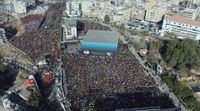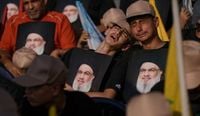On September 27 and 28, 2025, the streets of Beirut and beyond became the stage for a powerful display of remembrance, resolve, and political defiance. Tens of thousands of people, from students in the heart of Kashmir to Hezbollah supporters in Lebanon, gathered to honor the first anniversary of the deaths of Sayyed Hassan Nasrallah and Hashem Safieddine—two leaders whose assassinations by Israel have left indelible marks on the region’s political landscape.
According to Press TV, these commemorations were not just about mourning. They were a rallying cry, a reaffirmation of resistance, and a public declaration that the legacy of these leaders would not be forgotten. In Beirut, the city’s southern suburbs—once the site of devastation—became a place of tribute. Crowds flocked to the tombs of the fallen, their numbers swelling into the tens of thousands. Some traveled from neighboring countries, others from distant corners of Lebanon, all united by a common purpose: to reflect on the sacrifice of Nasrallah and Safieddine, and to declare their commitment to the cause for which these men died.
The significance of the occasion was heightened by the participation of students from Jamia Babul Ilm Mirgund Budgam and Maktab-e-Zahra Hasanabad Srinagar in Kashmir. As reported by the AhlulBayt News Agency, these students recited verses from the Holy Quran, paying tribute to what they called the “martyr of the resistance.” Officials from the Anjuman-E-Sharie Shian organization spoke passionately about Nasrallah’s life, describing him as someone who “dedicated his entire life to Islam, the Ummah, and protecting the oppressed.” They insisted that his martyrdom had only strengthened the resistance movement, inspiring new generations to carry his mission forward “with even more enthusiasm.”
“Mentioning Martyr Sayyed Hassan Nasrallah is not just about one individual, but about a movement, an idea, and a mission,” one speaker emphasized, as prayers were offered for Nasrallah’s soul and for unity within the Muslim world. The event in Kashmir underscored the profound resonance of Nasrallah’s death far beyond Lebanon’s borders, connecting disparate communities in grief and determination.
Back in Beirut, the mood was both somber and defiant. As AFP and Al Arabiya reported, Hezbollah’s current leader, Naim Qassem, addressed the massive crowd. Qassem’s words were unequivocal: “We will never abandon our weapons, nor will we relinquish them,” he declared, his voice echoing across the crowd. “We are ready for martyrdom.” The statement came amid mounting pressure from both the Lebanese government—which has ordered the army to disarm Hezbollah—and international actors, notably the United States, who have demanded the group lay down its arms. Yet, Qassem’s message was clear: disarmament was out of the question.
The context for this refusal is complex. Since October 2023, Hezbollah has been embroiled in a cycle of violence with Israel, launching rockets in support of Hamas in Gaza. What began as sporadic exchanges escalated into all-out war by September 2024, culminating in the assassinations of Nasrallah and, just days later, his successor Hashem Safieddine. Both men were killed in Israeli airstrikes that leveled entire blocks in Beirut’s southern suburbs, according to AP. The strikes targeted not just individuals, but the very leadership structure of Hezbollah, aiming to weaken the group’s grip on Lebanese politics.
Despite a ceasefire reached in November 2024, hostilities have not truly ceased. Israel continues to carry out regular strikes inside Lebanon and maintains troops at five border points within Lebanese territory. The Lebanese army, under pressure from Washington and other Western capitals, has drawn up plans to begin disarming Hezbollah in the south—a move that has only heightened tensions. Qassem, in his anniversary address, warned that such efforts would serve “Israeli aims” and provoke a “Karbala-like confrontation,” invoking a historic symbol of resistance and martyrdom in Shia Islam.
“Removal of weapons would serve Israeli aims and provoke a 'Karbala-like' confrontation,” Qassem warned, according to the Tehran Times. He also honored the late resistance leaders, citing “million-strong funerals and southern advances” as evidence that the resistance had regained initiative after recent hostilities. His speech was not just a defense of Hezbollah’s arsenal, but a call for Lebanese national sovereignty, reconstruction, and timely elections. Qassem urged the government to “prioritize national sovereignty, reconstruction, and timely elections,” and he defended support for the Lebanese army against what he described as “external threats.” Any project seen as serving Israeli interests, he vowed, would be fiercely opposed.
The commemorations themselves were marked by both solemnity and spectacle. Starting on September 25, 2025, Hezbollah projected images of Nasrallah and Safieddine onto Beirut’s iconic Raouche rock—a move that defied government bans and underscored the group’s willingness to challenge official authority. The events culminated in massive rallies, prayers, and speeches, all designed to reinforce the narrative of steadfast resistance and to inspire continued loyalty among supporters.
For many in Lebanon, the deaths of Nasrallah and Safieddine have left a leadership vacuum. According to Al Arabiya, much of Hezbollah’s military capability was destroyed in the Israeli campaign, and the group’s influence over Lebanese politics has waned. Beirut’s decision to order the army to disarm Hezbollah is seen by some as an attempt to reassert state authority and to respond to international demands. Yet, for Hezbollah’s supporters, these moves are viewed as capitulation to foreign pressure and as a betrayal of the sacrifices made by the resistance’s martyrs.
At the heart of the commemorations was a sense of continuity—a belief that the struggle did not end with the deaths of Nasrallah and Safieddine. As one speaker at the Kashmir event put it, “His services will always be remembered.” The participants reaffirmed their commitment to “continue spreading the martyr’s mission and ideas” and to help oppressed people around the world as a “religious and national duty.”
Even as Lebanon faces ongoing political and economic crises, the memory of these leaders remains a powerful force. The million-strong funerals, the continued defiance of disarmament efforts, and the public displays of unity all point to a movement that, while battered, is far from broken. The anniversary events served as both a memorial and a message: the resistance endures, and its supporters remain committed to the cause, whatever the future may hold.
As the crowds dispersed and the prayers faded, the legacy of Sayyed Hassan Nasrallah and Hashem Safieddine lingered in the air—a testament to the enduring power of martyrdom, memory, and resistance in Lebanon’s ongoing struggle for identity and sovereignty.


